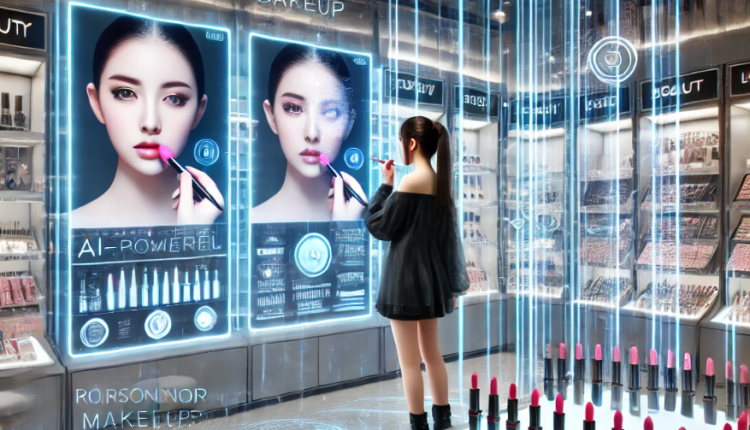In 2025, the beauty industry is undergoing a significant transformation, driven by the integration of artificial intelligence (AI) and advanced technologies. From personalized product recommendations to virtual try-ons, AI is revolutionizing the way consumers interact with makeup. This article explores the various ways in which AI is reshaping the beauty landscape, offering enhanced personalization, efficiency, and innovation.
Personalized Product Recommendations
One of the most notable advancements in the beauty industry is the use of AI for personalized product recommendations. By analyzing individual skin tones, types, and preferences, AI algorithms can suggest makeup products that are tailored to each consumer’s unique needs. This level of personalization ensures that customers find the most suitable products, enhancing their overall satisfaction and reducing the likelihood of returns.
For instance, AI-powered tools can assess a user’s skin condition through uploaded photos or real-time camera analysis. These tools consider factors such as skin undertones, texture, and concerns like acne or dryness. Based on this analysis, the system recommends foundations, concealers, and other products that match the user’s skin perfectly.
Virtual Try-Ons
Virtual try-on technology has become increasingly sophisticated, allowing consumers to test makeup products virtually before making a purchase. Using augmented reality (AR), users can see how different shades of lipstick, eyeshadow, or blush look on their faces in real-time. This interactive experience not only enhances the shopping process but also empowers consumers to make informed decisions without physically trying the products.
Brands are integrating virtual try-on features into their websites and mobile apps, providing a seamless and engaging user experience. This technology is particularly beneficial in the era of online shopping, where physical testers are not always accessible.
AI-Driven Shade Matching
Shade matching has historically been a challenge in the makeup industry, with consumers often struggling to find the perfect foundation or concealer shade. AI addresses this issue by analyzing a user’s skin tone and undertones to recommend the most accurate shade matches. By utilizing machine learning algorithms and extensive databases of skin tones, AI systems can provide precise recommendations that cater to a diverse range of complexions.
This technology not only improves customer satisfaction but also promotes inclusivity by ensuring that individuals with all skin tones can find suitable products. As a result, brands are expanding their shade ranges and leveraging AI to better serve a diverse customer base.
Smart Beauty Devices
The integration of AI into beauty devices has led to the development of smart tools that enhance makeup application and skincare routines. For example, AI-powered mirrors can analyze a user’s skin condition and provide personalized recommendations for makeup application or skincare products. These devices offer real-time feedback, guiding users through their beauty routines with precision and expertise.
Additionally, smart makeup applicators equipped with sensors and AI algorithms can adjust application techniques based on the user’s skin type and desired look. These innovations streamline the beauty process, making it more efficient and tailored to individual needs.
Enhanced Customer Engagement
AI technologies are also transforming customer engagement in the beauty industry. Chatbots and virtual assistants powered by AI can provide instant support, answering queries, and offering product recommendations. These tools enhance the customer experience by delivering personalized assistance and reducing response times.
Moreover, AI-driven analytics enable brands to understand consumer behavior and preferences better. By analyzing data from various touchpoints, companies can tailor their marketing strategies, product offerings, and customer interactions to align with consumer expectations.
Ethical Considerations and Data Privacy
As AI becomes more prevalent in the beauty industry, ethical considerations and data privacy concerns have come to the forefront. Brands must ensure that they handle consumer data responsibly, obtaining proper consent and safeguarding personal information. Transparency in data collection and usage is essential to build trust with consumers.
Additionally, there is a need to address potential biases in AI algorithms. Ensuring that AI systems are trained on diverse datasets helps prevent discriminatory outcomes and promotes inclusivity in product recommendations and virtual try-ons.
The Future of AI in Beauty
Looking ahead, the role of AI in the beauty industry is poised to expand further. Advancements in machine learning and data analytics will lead to even more personalized and efficient beauty solutions. From AI-generated makeup tutorials to predictive trend analysis, the possibilities are vast.
Furthermore, collaborations between tech companies and beauty brands will drive innovation, resulting in cutting-edge products and services that redefine the consumer experience. As AI continues to evolve, it will undoubtedly play a central role in shaping the future of beauty.
Conclusion
In 2025, AI is revolutionizing the beauty industry by offering personalized experiences, enhancing product recommendations, and streamlining beauty routines. Through virtual try-ons, smart devices, and AI-driven analytics, consumers are empowered to make informed decisions and enjoy tailored beauty solutions. As the industry continues to embrace technology, the integration of AI will remain a driving force in delivering innovative and inclusive beauty experiences.


